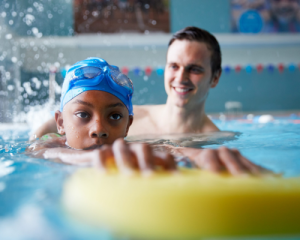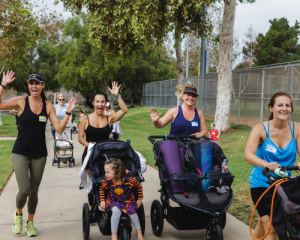
A local pediatric occupational therapist and mom to a neurodivergent child offers tips to help minimize sensory overload during social outings.
Think back to a time when you had a debilitating headache or fever. The sound of a door closing was like nails on a chalkboard. The slightest peek of sunshine made your eyeballs feel like they were burning from the inside out. Every blanket felt scratchy and even though your partner meant well, when they tried to rub your back, it felt like prickly thorns and you immediately swatted them away. You were irritable and moody and maybe snapped at others for no reason, other than you were completely dysregulated from being sick.
Now imagine that you experience that on a daily basis. That’s what it can feel like to a neurodivergent child with sensory sensitivities. The term neurodivergent is an inclusive way to describe individuals who have brain-based differences in the way that they learn, behave, communicate and process the world around them. It can include disabilities like autism, ADHD, anxiety or sensory processing disorder.
For neurodivergent children with sensory sensitivities, many subtle sounds, sights, feelings, smells or tastes can all feel very overpowering and intense for them, resulting in extreme meltdowns or trying to run away or avoid certain environments. An everyday outing to the grocery store can cause as much stress to a neurodivergent child’s nervous system as a fever or migraine can for a neurotypical person. Doctor visits, zoos, theme parks, museums, aquariums, birthday parties and restaurants can also be full of sensory triggers for neurodivergent kids.
Neurodivergent children with sensory sensitivities can often “hold it together” while they’re in an over-stimulating environment, but will later have a huge meltdown as a delayed stress response. For example, maybe your child has a great time at a birthday party, but later that day when you get home, or the next day, they’re still irritable and dysregulated (i.e. moody, irritable, hyperactive, overly silly, aggressive, loud or completely shut down).
Over the past couple of years, children (and their parents) have had less exposure and practice tolerating some of these real-world sensory obstacles with things like social distancing and crowd management at community spaces like museums and restaurants. We’re all excited to see life starting to return to normal, but for parents of neurodivergent children, there’s a bit of hesitancy. Parents are nervous about how to re-introduce their neurodivergent children to the sensory-filled world — some may have never even experienced it yet. It can be stressful for a sensory child to go from a quiet, home-based routine with familiar sounds, sights, smells and tastes to a museum or birthday party with new, unexpected or out-of-your-control sensory inputs.
Related Posts:
- Parenting a Child with Aspergers Through a Pandemic
- Special Needs Programs Adapting Due to The Pandemic
- Special Needs Learning and The Pandemic
Here are some actionable strategies you can try in order to minimize the sensory overload on your community outings:
- Find videos and pictures of the place you’ll be visiting, including photos of people they might see, like pictures of family members who will be at the birthday party, or pictures of the characters they might see at Disneyland. A visual representation of new or unfamiliar environments can help prepare the child for what to expect.
- Give your child a “heads-up” of the particular sequence of events that will happen. For example, “When we get to the museum, first we’ll buy tickets, then we’ll see the sharks. After the sharks, we’ll have lunch.” A visual schedule may be helpful.
- If you have a noise-sensitive child, consider bringing noise-reducing headphones. These don’t completely block out sounds but dull them down just enough so the child can feel safe.
- Bring something that can provide the child with opportunities to squeeze, push, pull or chew, which can provide calming sensory input to the nervous system, called proprioceptive input. Examples include: a stress ball or chewy snacks or asking them to help you push the grocery cart or stroller. You could also look into bringing a weighted lap pad or weighted vest to add extra proprioceptive input.
- Consider the times or days of the week you’re going to a particular place, like theme parks or museums. Try to schedule your visits at less busy times to avoid extra stimulation.
- Play a game of “I spy,” which can help the child keep their “upper brain” onboard, as opposed to automatically triggering their lower brain (responsible for fight-or-flight meltdown mode). You could ask them to find three things that are blue, or play “I spy” with things that start with the letter D.
- Ensure that they are wearing clothes that are comfortable to them. Many neurodivergent children have sensory sensitivities to clothes, especially clothes like jeans, pants, socks or collared shirts. Be flexible, even if they don’t want to wear what you have set out for them, it’s important to allow them to be as regulated as possible, which might include opting for shorts instead of pants.
- Plan for “body check-in” breaks and have planned opportunities for sensory breaks. For example, after a train ride at a theme park, check in with your child and say, “How does your body feel?” and check for signs of dysregulation (pupils dilated, fast breathing, irritability, covering ears). Offer a sip of water, sit and cuddle on a bench or have a crunchy/chewy snack (which offers proprioceptive, calming input).
Whether it’s reintegrating into the community after the pandemic, going to the first day of school or visiting Disneyland for the first time, neurodivergent children benefit from accommodations to be successful. Accommodating the environment, modifying the activity or simply bringing some sensory tools are the best ways you can support your neurodivergent child out in the community. When we are proactive about planning for these accommodations, our neurodivergent children can feel confident in their bodies.
Laura Petix is a pediatric occupational therapist residing and working in Irvine. She’s mom to a neurodivergent 4-year-old girl. Petix works with parents of neurodivergent children to teach them how sensory processing abilities impact learning and behavior. You can find her on Instagram @Theotbutterfly and on her podcast: The Sensory W.I.S.E. Solutions Podcast for Parents.







Leave a Reply